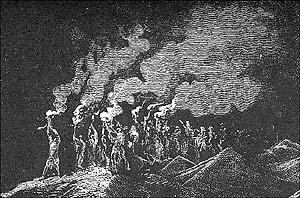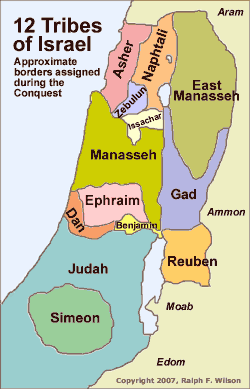
|
Old Testament
New Testament
Gospels
Acts
Paul's Letters
General Letters
Revelation
Topical Studies
Beginning the Journey (for new Christians). en Español

|
Old Testament
New Testament
Gospels
Acts
Paul's Letters
General Letters
Revelation
Topical Studies

|
Home
Bible Studies
Articles
Books
Podcasts
Search
Menu
Donate
About Us
Contact Us
FAQ
Sitemap
 Gustave Doré (French illustrator,1832-1883), detail from "The Midianites Put to Flight" (1865), woodcut. Larger image. Full picture. |
Cycles of Prosperity and Oppression
The Book of Judges is a collection of stories about the history of Israel after the death of Joshua and before Samuel. Israel was a loose confederation of Twelve Tribes settled in a land only partially conquered from the Canaanites (See more in the Appendix: "Peoples of the Promised Land.").
The cycle of the times -- apostasy, oppression, deliverance by a judge -- was enacted many times over these two centuries. The cause of this misery, according to the author of Judges, is idolatry, straying from the exclusive worship of Yahweh and turning to other gods served by the people of Canaan. This is pretty well summed up in Judges 2 where the author describes what happened after Joshua's death:
"After that whole generation had been gathered to their fathers, another generation grew up, who knew neither the LORD nor what he had done for Israel. Then the Israelites did evil in the eyes of the LORD and served the Baals. They forsook the LORD, the God of their fathers, who had brought them out of Egypt. They followed and worshiped various gods of the peoples around them. They provoked the LORD to anger because they forsook him and served Baal and the Ashtoreths. In his anger against Israel the LORD handed them over to raiders who plundered them. He sold them to their enemies all around, whom they were no longer able to resist. Whenever Israel went out to fight, the hand of the LORD was against them to defeat them, just as he had sworn to them. They were in great distress. Then the LORD raised up judges, who saved them out of the hands of these raiders." (Judges 2:10-16)
When we come to the story of Gideon in Judges 6-8, the Israelites are worshipping Baal and being oppressed by the Midianites, who swoop in each year and take whatever harvests and cattle they can find, leaving the Israelites destitute.
Political Structure
During the leadership of Joshua, the 12 tribes of Israel were assigned territories in Canaan, related in some measure to the population of the tribe. There was a common commitment of the tribes to the Covenant made at Sinai, And the national worship center, the Tabernacle of the Covenant, was located in Shiloh with a high priest in charge. However, Israel lacked a central government and had a lessened sense of being one nation than there had been under Moses and Joshua. Instead of operating together as a national unit, each tribe pretty much governed itself. Since there was little coordination between tribes, the people were more vulnerable to well armed and well organized enemies. During this period Israel operated as a loose confederacy of tribes, with the emphasis on loose. Gideon is a member of the tribe of Manasseh.
Judges
We think of "judges" as people charged with settling disputes. But most of the judges mentioned in this book are warriors, men and women empowered by the Spirit to bring military deliverance to Israel, who then continue on as leaders until their death. Exceptions to this are Deborah and Samuel who focused on settling disputes, and only tangentially acted as deliverers.
There are challenges in precise dating, but here's an overall look at this approximately 200 year period. You'll notice that the judges come from different tribes and meet challenges from various neighboring nations.
|
Approx Dates |
Delivering Judge |
Judge's Tribe |
Oppressing Nation |
|
1230 BC |
Joshua |
Ephraim |
Canaanites |
|
1200 BC |
Othniel |
Judah |
Mesopotamia |
|
1170 BC |
Ehud |
Benjamin |
Moab |
|
1150 BC |
Shamgar |
Naphtali ? |
Philistines |
|
1125 BC |
Deborah |
Ephraim |
Canaanites |
|
1100 BC |
Gideon |
Manasseh |
Midianites |
|
1080 BC |
Abimelech |
Manasseh |
|
|
|
Tola |
Ephraim |
|
|
|
Jair |
Manasseh |
|
|
1070 BC |
Jephthah |
Manasseh |
Ammonites |
|
1070 BC |
Samson |
Dan |
Philistines |
|
1050 BC |
Ark captured |
Ephraim |
Philistines |
|
1020 BC |
Saul anointed king by Samuel |
Benjamin |
Philistines |
However, it would be a mistake to assume that all the Judges exercised consecutive periods of leadership. At least some of the leaders and events were probably largely concurrent, so the dates above should be looked at as only tentative.
Religious Situation
So far as religious allegiance, the period was mixed. As we saw in the text above:
"Then the Israelites did evil in the eyes of the LORD and served the Baals. They forsook the LORD, the God of their fathers, who had brought them out of Egypt. They followed and worshiped various gods of the peoples around them. They provoked the LORD to anger because they forsook him and served Baal and the Ashtoreths." (Judges 2:11-13)
It wasn't a complete forsaking. It was more subtle than that. The Israelites retained a sense that Yahweh was their national God that had delivered them historically (Judges 6:13). But they also believed in the local fertility gods, Baal and Ashtoreth, male and female deities that were worshipped all over the ancient Near East. Mixing religious beliefs is called syncretism. This was just what Joshua had warned against in his final word to Israel before his death. He had called them to wholehearted devotion to Yahweh only:
"Choose for yourselves this day whom you will serve, whether the gods your forefathers served beyond the River, or the gods of the Amorites, in whose land you are living. But as for me and my household, we will serve the LORD." (Joshua 24:15)
It was a period of belief in Yahweh as well as having clay household images of the goddess Asherah, of paying homage to the Lord as well as Baal. Any kind of deliverance from enemies must first include a deliverance from the worship of the Baals and Ashtoreths. (See more in the Appendix: "Canaanite Religions and Baal Worship.")
The Purpose of Judges
I see two themes running through the book of Judges:
- That wholehearted and exclusive worship of Yahweh is the key to national deliverance, and
- That centralized hereditary kingship is necessary for the well-being of the nation.2 The characteristic observation is: "In those days Israel had no king; everyone did as he saw fit" (Judges 17:6).
Author and Date of Judges
The book of Judges is comprised of a collection of stories of the exploits of national heroes during this period between the Conquest and Israel's first king. At some point, very early we believe, an editor pulled these accounts together into a single document illustrating the ups and downs of this period. The Rabbis believed that Samuel was the author of Judges, though there is no internal evidence of this. On the contrary, in light of his own history, Samuel would be unlikely to make the case for a king other than Yahweh (1 Samuel 8).
 Available in paperback, PDF, and Kindle formats. |
However, Judges seems to have been compiled quite early, since Judges 1:21 indicates that the Jebusites were still in Jerusalem at the time it was written. Old Testament scholar R.K. Harrison observes,
"It seems highly improbable that an editor who was compiling the account for the first time at a much later period would have allowed the text to stand had contemporary conditions been different, for he would almost certainly have furnished an explanatory gloss for the verse in question. Therefore it would appear that this particular section, and perhaps even the book as a whole, was in substantially its present form before David made the Jebusite stronghold his capital city (2 Samuel 5:6ff)."3
I conclude that Judges was compiled by an anonymous editor early in the period of the kings, perhaps 1020 to 1000 BC.
Judges is an fascinating book that is hard to put down, since it records in compelling narrative form the story of God's dealing with men and women who lived in dangerous and difficult times. Judges is clear evidence that God does honor faith and that he does save his people, by sending deliverers to intervene in history as he has done at the end of the age in Jesus Christ our Lord.
References
- This chronology assumes a 13th century conquest. It is based on a chronology by Arthur E. Cundall in Arthur E. Cundall and Leon Morris, Judges-Ruth (Tyndale OT Commentaries; Inter-Varsity Press, 1968), pp. 32-33.
- Roland Kenneth Harrison, Introduction to the Old Testament (Eerdmans, 1969), p. 692.
- Harrison, Introduction, p. 689.
Copyright © 2026, Ralph F. Wilson. <pastor![]() joyfulheart.com> All rights reserved. A single copy of this article is free. Do not put this on a website. See legal, copyright, and reprint information.
joyfulheart.com> All rights reserved. A single copy of this article is free. Do not put this on a website. See legal, copyright, and reprint information.



 To be notified about future articles, stories, and Bible studies, why don't you subscribe to our free newsletter, The Joyful Heart, by placing your e-mail address in the box below. We respect your
To be notified about future articles, stories, and Bible studies, why don't you subscribe to our free newsletter, The Joyful Heart, by placing your e-mail address in the box below. We respect your